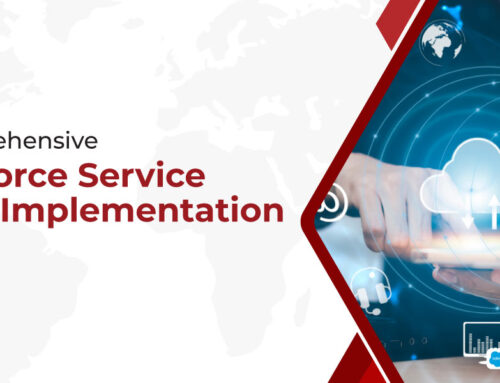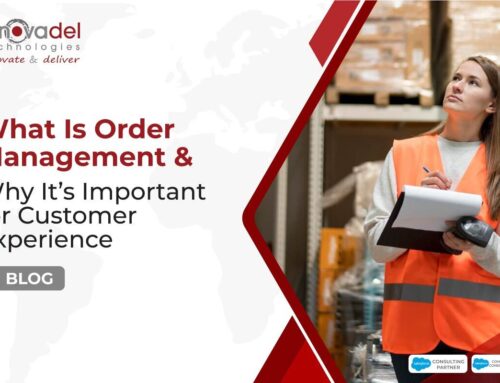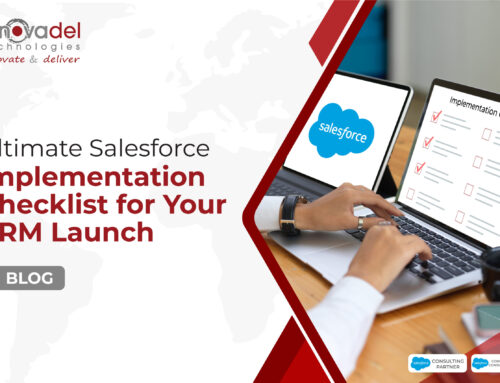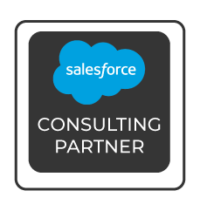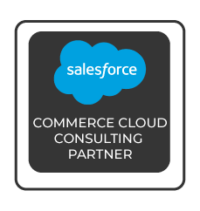Salesforce Implementation Services – Complete Guide
Experiencing an implementation journey in the business can be quite overwhelming. Your main focus should be to guarantee a profitable outcome for your innovation investment. It is key when it comes to putting your plans into action, getting it right, on time, without spending too much, and making sure it works.
Understanding the essential steps for a successful implementation is a good starting point. However, it’s important to understand warning signs that suggest your implementation is going wrong.
If you’re getting ready to use Salesforce, you’ve probably spent much time and money ensuring it’s right for your business. In this article, we’ll discuss how Salesforce implementation services can help you and what to avoid during implementation.
So, let’s get started!
Ways of Salesforce Implementation into Your Business
There are 3 ways you can implement Salesforce into your business. Let’s have a look at them:
Do It Yourself
Implementing Salesforce yourself is a feasible option for businesses of all types. They possess the required technical know-how, and self-implementation can streamline the process, keeping it simple and easy to follow. However, self-implementation is the wrong choice without any knowledge of the Salesforce ecosystem.
In-House Team
Another approach to implementing Salesforce is to use an in-house team. At the start, this might appear cost-effective compared to hiring external specialists who typically charge higher fees. However, it can present challenges in the long run.
Salesforce Implementation Partner
While you can implement Salesforce independently or have an in-house team, neither approach guarantees the level of expertise provided by a dedicated Salesforce implementation partner. To ensure smooth implementation, it is best to seek help from experienced professionals.

Benefits of Working with Salesforce Implementation Partners
Working with a Salesforce consulting partner can be a game changer if you plan to implement Salesforce CRM solutions for your business. Here’s why:
Extensive Expertise
Salesforce CRM covers various aspects of business operations, including sales, marketing, and customer service. Working with a trusted partner ensures access to a wealth of knowledge and experience across these domains.
Maximum Capabilities
Third-party add-ons and cross-platform interfaces can enhance Salesforce products’ functionality. Top Salesforce consulting providers thoroughly explore the ecosystem to leverage its full potential and tailor solutions to your needs.
Seamless Integration
Larger corporations often use multiple technology solutions across different departments. Integrating Salesforce products like Sales Cloud with existing systems requires expertise to ensure smooth compatibility and avoid conflicts.
Scale for Growth
Smaller companies aiming for rapid growth soon realize the limitations of manual processes or basic tools like spreadsheets. Implementing a CRM solution like Salesforce becomes essential for automating workflows and delivering personalized customer experiences.
Operational Efficiency
Many Salesforce customers rely on top implementation service partners for operational reasons. These partners bring in-depth knowledge and streamlined processes to ensure efficient deployment and ongoing support.
Strategic Alignment
Engaging a partner early in the implementation process is crucial for aligning Salesforce with your business expansion goals. Collaborating closely with both internal teams and external partners ensures that your organization remains integral to the scalability and implementation journey.
How to Implement Salesforce in Your Business?
Now, let’s have a look at the steps of Salesforce implementation services for your business:
1. Refine Your Business Objectives, Goals, and KPIs
Clarify your business objectives, goals, and key performance indicators (KPIs) for success. Here’s how to ensure SMART goals and define relevant KPIs:
Specific
Clearly outline what you want to achieve. Avoid vague objectives. For example, instead of stating “increase sales,” specify “increase sales by 20% within the next quarter.”
Measurable
Create concrete criteria for measuring progress toward your goals. For example, if your goal is to improve customer engagement, you might measure it by the number of interactions on social media or website visits.
Achievable
Given your resources and constraints, set realistic and attainable goals. Stretch yourself, but don’t set unrealistic targets.
Relevant
Align your goals with your overall business strategy and priorities. Focus on objectives that contribute directly to your company’s growth and success.
Time-bound
Define a specific timeframe for achieving your goals. For example, set a three-month deadline to launch a new marketing campaign or improve customer service response times.
Define KPIs that will help you track progress toward your goals effectively. These could include:
- Lead conversion rates
- Customer engagement levels
- Sales cycle duration
2. Identify Key Stakeholders
Successful Salesforce services require the active participation of stakeholders, including executives, sales leaders, marketing heads, customer service supervisors, and IT leaders.
3. Collect and Organize Current Data
Before Salesforce implementation services, it’s crucial to identify and classify your data sources accordingly. These may include your current CRM system, spreadsheets, marketing tools, customer support records, and other pertinent data repositories.
4. Define Necessary Reports
Reports provide a complete overview of your business data and help monitor progress towards your objectives.
5. Evaluate Implementation Risks
Data migration errors could result in the loss or corruption of valuable information, while user resistance might impede adoption. Process disruptions can affect daily operations. However, these risks can be effectively managed with strategic planning and appropriate support.
6. Create Estimated Timeline & Budget
Determining an achievable timeline and budget for your Salesforce project is essential. Multiple factors, such as data migration, customization, testing, and user training, must be considered.
7. Partner with a Certified Salesforce Consultant
Look for certified Salesforce consulting partners, particularly those with certifications relevant to your industry. These experts have undergone extensive training and examinations, demonstrating their proficiency in the Salesforce ecosystem.
How to Prevent Salesforce Implementation Failures
Leverage Salesforce Beyond CRM
Salesforce is built on the Force.com platform and offers more than just CRM capabilities. Maximizing its functionality allows you to streamline various business areas, such as pricing quotes, marketing, customer service portals, and ERP.
Integrate Salesforce with Other Systems
Application integration is crucial for improving business performance. Integrate Salesforce with other business applications to maximize its benefits and ensure seamless data flow across your organization.
Involve IT for Effective Integrations and Security
Engage your IT department from the outset to ensure a smooth implementation. IT professionals can understand Salesforce’s architecture, data security measures, and integration points with other systems, ensuring a robust and secure setup.
Drive Adoption from the Executive Level
Executive sponsorship is vital for driving adoption and change management. Engage executive sponsors who actively champion the Salesforce project, drive adoption, and communicate its benefits to the team.
Clean Up Data Before Migration
Data quality is crucial for the success of Salesforce implementation. Clean up your data before migration to avoid bigger data quality problems later on. If necessary, engage with third-party data companies to validate the quality of your data.
Conclusion
Salesforce has the potential to transform your CRM processes significantly. However, it’s essential to approach the implementation with caution. Following the steps outlined above can help you avoid common pitfalls and increase the likelihood of successful Salesforce implementation services.
Hire Salesforce implementation partners for satisfactory results!
Related Posts
If you enjoyed reading this then please explore our other Articles below

